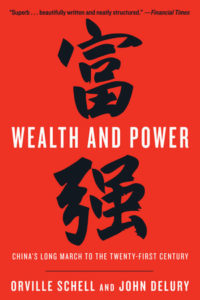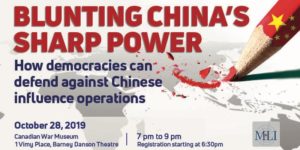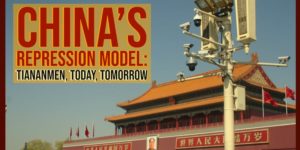If China’s growth slows further in the coming years, as is likely, the Chinese government will probably double down on the repression and aggression of the past decade, argues Michael Beckley, Associate Professor of Political Science at Tufts University, a Jeane Kirkpatrick Visiting Scholar at the American Enterprise Institute, and the author of Unrivaled: Why America Will Remain the World’s Sole Superpower.
 When the country’s leaders cannot rely on rapid growth to bolster their domestic legitimacy and international clout, they will be all the more eager to squelch dissent, burnish their nationalist credentials, and boost the economy by any means necessary, he writes for Foreign Affairs:
When the country’s leaders cannot rely on rapid growth to bolster their domestic legitimacy and international clout, they will be all the more eager to squelch dissent, burnish their nationalist credentials, and boost the economy by any means necessary, he writes for Foreign Affairs:
Perhaps in a few decades, Chinese power will gradually mellow. Now, however, is a moment of maximum danger, because China is too weak to feel secure or satisfied with its place in the world order but strong enough to destroy it. As China’s economic miracle comes to an end, and Xi’s much-touted Chinese Dream slips away, the United States must contain China’s outbursts with a careful blend of deterrence, reassurance, and damage limitation. Compared to gearing up for a whole-of-society throwdown against a rising superpower, this mission may seem uninspiring. But it would be smarter—and ultimately more effective.
For those who believe that the Chinese state under Xi poses no threat, some recent examples from the region could be instructive, analyst Tom Hanson writes for ASPI’s The Strategist:
- First and most obvious is Beijing’s treatment of Hong Kong. The ‘one country, two systems’ promise appears to be on life support, and the ‘freest city in Asia’ will ultimately be under the domination of a ruthlessly oppressive regime—no doubt aided by technologies stolen from laboratories and industries around the world.
- Second is the recent shift in the Indo-Pacific region against Taiwan in favor of Beijing. Last month, Kiribati and Solomon Islands announced that they were withdrawing their recognition of the government of the Republic of China in Taipei…
 It would be a hugely welcome development if U.S. national security and tech sectors could realize that rising to the Chinese challenge is more important for their survival than fighting each other. The Chinese Communist Party and the Chinese corporate sector are laser-focused on their objective — to dominate the next generation of technology and dictate the standards for its use, the Washington Post’s Josh Rogin adds.
It would be a hugely welcome development if U.S. national security and tech sectors could realize that rising to the Chinese challenge is more important for their survival than fighting each other. The Chinese Communist Party and the Chinese corporate sector are laser-focused on their objective — to dominate the next generation of technology and dictate the standards for its use, the Washington Post’s Josh Rogin adds.
“China is offering surveillance, censorship and opacity. The free societies should offer public trust, transparency and accountability as an alternative,” said Christopher Walker, vice president at the National Endowment for Democracy. “U.S. technology leaders should see these values as an opportunity in a competition with China.”
Communist Party ‘might collapse’
According to a report by the National Endowment for Democracy, a DC-based democracy assistance group, China uses sister city agreements to plant political roots in European cities, Transitions Online adds. Following the classical model of “soft power expansion,” China has created networks of influential individuals and institutions that have then supported economic expansion into Central Europe. The country also aims to spread its history, culture, and technological achievements in a way that paints it as “a non-threatening country of mild fascination,” according to the report.
 Many midranking officials resent Mr. Xi’s anticorruption drive, which has shrunk their income and influence, Ke Huaqing, a professor at the China University of Political Science and Law in Beijing who studies the rules and workings of the party, said in an interview with the Times:
Many midranking officials resent Mr. Xi’s anticorruption drive, which has shrunk their income and influence, Ke Huaqing, a professor at the China University of Political Science and Law in Beijing who studies the rules and workings of the party, said in an interview with the Times:
Cadres have also been punished for complaining about government policies, defying orders to move to other posts, or spreading rumors about leaders. When the party recently announced the punishment of Liu Shiyu, the former chairman of the China Securities Regulatory Commission, it said his misdeeds included a “wavering” political stance and failure to rigorously enforce central leaders’ decisions.
“The Chinese Communist Party could get away without cleaning itself up,” Professor Ke said, “but after a period of time it might collapse.”

 China’s ruling Communist Party is holding a key meeting this week amid a drastically slowing economy, ongoing protests in Hong Kong and pushback abroad against Beijing’s global ambitions,
China’s ruling Communist Party is holding a key meeting this week amid a drastically slowing economy, ongoing protests in Hong Kong and pushback abroad against Beijing’s global ambitions, 






